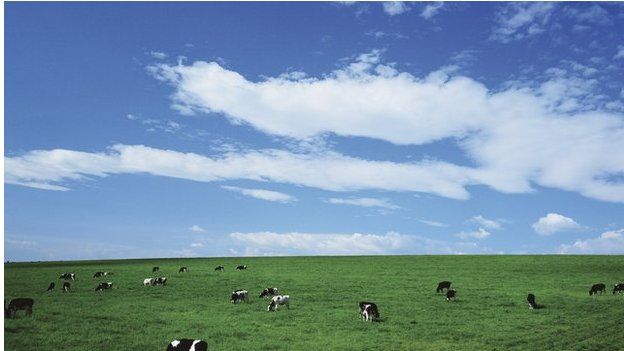Agricultural emissions 'reality check'
- Published

A new report says that global agricultural emissions must be slashed to prevent the planet warming by more than 2C over the next century.
The current focus is on reducing emissions from transport and energy.
But an international team of scientists argues that if farm-related emissions aren't tackled then the Paris climate targets will be breached.
An estimated one-third of our greenhouse gas emissions come from agriculture.
The report by researchers from the universities of Vermont and Sheffield and the CGIAR Research Program on Climate Change examines non-CO2 emissions, such as methane and nitrous oxide.
Cattle produce methane as part of their digestion and emit it mostly through belching. The addition of natural or synthetic fertilisers to soils releases large amounts of nitrous oxide.
The researchers have calculated for the first time that these emissions must be reduced by one gigatonne per year in 2030.
They estimate that the mitigation plans currently in place would only cut emissions by 21-40%.
'Reality check'
Co-author Lini Wollenberg from the University of Vermont said: "This research is a reality check. Countries want to take action on agriculture, but the options currently on offer won't make the dent in emissions needed to meet the global targets agreed to in Paris.
"We need a much bigger menu of technical and policy solutions, with major investment to bring them to scale."
However, the authors warn that efforts to cut emissions levels must be balanced with the need to produce food.
"We need to help farmers play their part in reaching global climate goals while still feeding the world," says Prof Pete Smith from the University of Aberdeen and co-author of the paper.
"Reducing emissions in agriculture without compromising food security is something we know how to do. A lot can already be done with existing best management practices in agriculture."
"The tough part is how to reduce emissions by a further two to five times and support large numbers of farmers to change their practices in the next 10 to 20 years."
The scientists say that "more transformative technical and policy options" will be needed.
They highlight methane inhibitors that reduce dairy cow emissions by 30% without affecting milk yields. Also, breeds of cattle that produce lower methane, and varieties of cereal crops that release less nitrous oxide.
At the Paris climate summit, 119 nations pledged to reduce agricultural emissions. However, there was no indication how they would do this.
The scientists looked at current agricultural methods that could help, such as ensuring the efficient use of water to irrigate crops, improving the use of fertilisers such as nitrogen and manure and by managing livestock in a more efficient and sustainable way.
However they argue that merely improving current systems would "require massive investment, information sharing and technical support to enable a global-scale transition."
Commenting on the report, Professor Duncan Cameron, chair of plant and soil biology at Sheffield University, said: "This study is really important because it highlights the huge contribution of agriculture makes to the amounts of greenhouse gasses released as a result of human activity every year and that much of this comes from the production of and use of nitrogen fertiliser."
"Reducing emissions by gigatonne, which is roughly equivalent to the weight of all of the major skyscrapers in the world combined, sounds like a tall order, but if we act now and take onboard the combination of approaches suggested in this study, it is potentially achievable while maintaining the security of the world's food supply."
Follow Claire on Twitter.